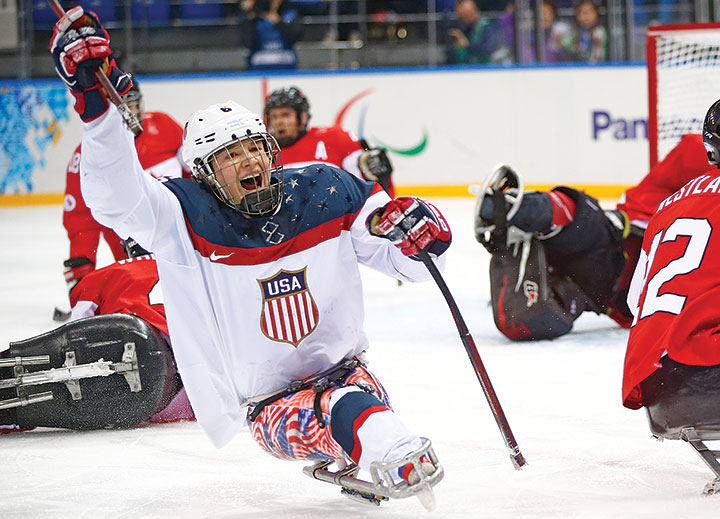Paralympics: Shooting for Gold
Farmer ’20, a sled-hockey standout, will play for the U.S. in South Korea in March
As a 16-year-old, Declan Farmer ’20 already was an international superstar in the sport of sled hockey, an adaptive version of ice hockey for players with physical disabilities. He debuted at the Paralympics in 2014, scoring twice in the United States’ semifinal win over Canada and helping his team win gold against host Russia two days later. He was honored as the best male athlete with a disability at the ESPY Awards that year. And during a visit to the White House, he even got a shoutout from President Barack Obama. “That was really cool,” Farmer said.
But at Princeton, Farmer pursues his sport in solitude. With his U.S. teammates spread around the country and no club teams nearby, he practices his skating and stickhandling at Baker Rink, lifts weights at the gym, and pedals a hand bike in his dorm room. When the national team meets up to practice or play tournaments, he packs his gear and books and heads to the airport, anxious to put his training to the test.
“I always look forward to these trips, even training camps in the middle of the season where all we do is practice. It’s exciting to meet up with the guys to just play hockey,” said Farmer, who will be chasing Paralympic gold again in March in Gangneung, South Korea.
Born without legs, Farmer started using prosthetics before his first birthday. He’s from an athletic family — his dad, Matt ’83, ran track and cross country at Princeton — and his parents sought out adaptive sports programs near their home in Tampa, Fla. As an 8-year-old, Farmer went to a sled-hockey clinic run by a visiting club from Long Island, and it was love at first skate. “It was the first time I could feel really fast in a sport,” he said.
Sled hockey (known as “sledge” in some countries) has the same rules as stand-up ice hockey — and just as much physical contact. The players skate around the ice on lightweight sleds and propel themselves with both arms, using shortened hockey sticks that have metal teeth on the butt end. Each player uses two sticks, which opens a range of shooting options (forehand or backhand from either side of the body).
Farmer started playing sled hockey just as it was beginning to take hold in Florida; the NHL’s Tampa Bay Lightning sponsored a new club. He did not play in tournaments until he was a teenager, and his talent quickly drew the attention of the U.S. national team, including general manager Dan Brennan. “When I’m on the ice with Declan, I see offensive skill in him that I haven’t seen in most able-bodied players,” Brennan said. “He’s a really smart player, he sees the ice really well, he makes great plays with the puck, and he works very hard in practice.”
While most of the U.S. players are moving to Chicago to ramp up their training this month, Farmer planned to be back at Princeton for fall-semester exams. Brennan said the coaches “see the bigger picture” for players who are in college and work to accommodate their academic schedules. Farmer said his professors have been accommodating as well.
The United States won gold at the last two Paralympics (2010 and 2014), but Canada knocked off the Americans in the 2017 World Championships, setting up a potential rematch in South Korea. “We think when we put everything together, we’re the best team in the world,” Farmer said. “That doesn’t take anything away from the other teams around the world. We’re ready for some intense competition.”










No responses yet